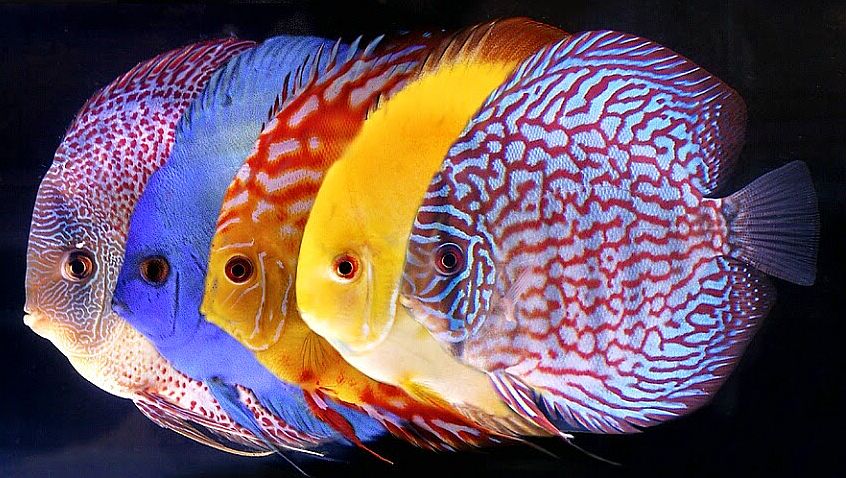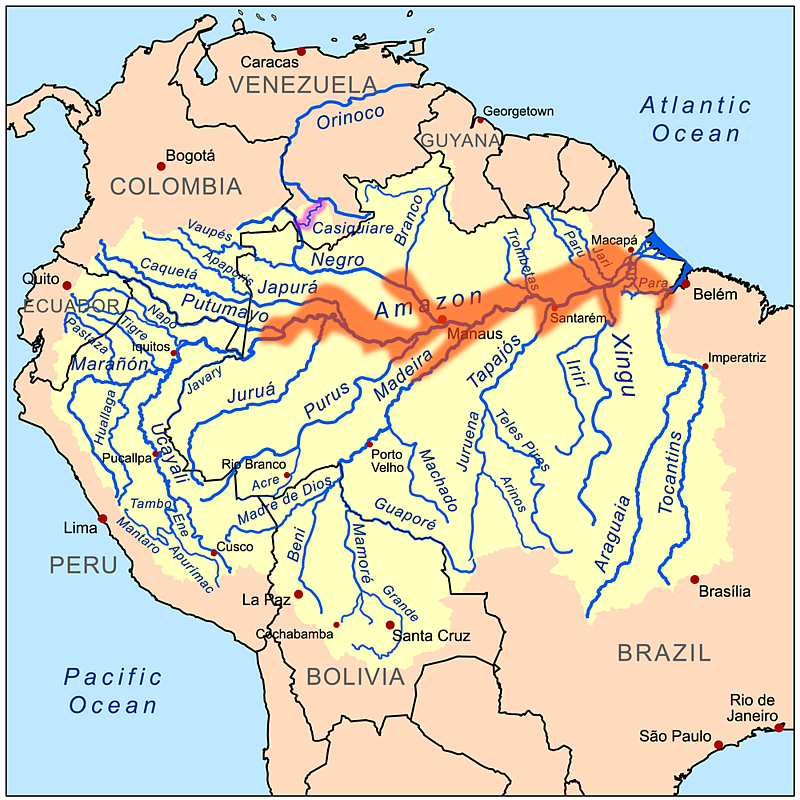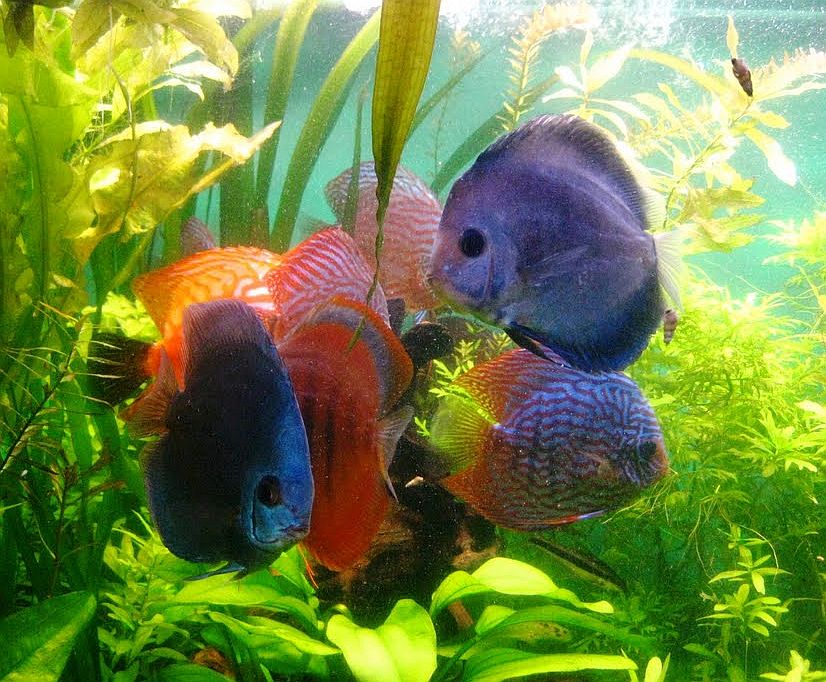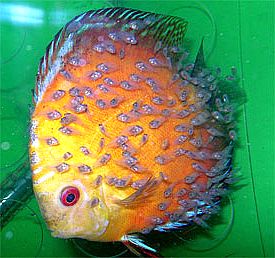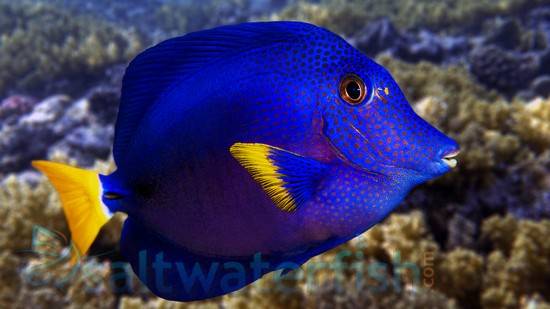Discus (Symphysodon) is a regal genus of Cichlids that is native to the Amazon River basin of South America. Tropical fish keeping enthusiasts also refer to Discus as the Pompadour Fish because of their distinctive shape and bright colors.
There are three Symphysodon species that inhabit the margins of the floodplain lakes and rivers in the Amazon basin in different geographic locations.
Symphysodon aeuifasciatus are found in the Rio Solimões, Rio Amazonas, and Río Putumayo-Içá in Brazil, Colombia and Peru.
Symphysodon Discus are found in the lower sections of the Abacaxis, Rio Negro and Trombetas rivers, and Symphysodon tarzoo are found upstream of Manaus in the western Amazon.
The natural habitat for Discus is the shallow streams, creeks, and small lakes running off the Amazon River and it’s tributaries.
Wild Symphysodon like to school with others of their kind and live among submerged tree roots, close to shore.
All Discus species living in “mixed” tropical water areas of the Brazilian Amazon and are considered Neotropical.
All three species of Symphysodon are highly favored among experienced tropical fish keeping enthusiasts and do quite well in densely planted aquariums.
Discus (Symphysodon) have a round, laterally compressed body shape and are absent any extended fins; hence the name “Discus”. The sides of these fish are frequently patterned in different shades of green, brown, blue, and red. Adult Discus are approximately the same height and length of about 8″ to 10″. There is no real sexual dimorphism for this fish although, in some solid colored (red cover or red melon) varieties, the females are more deeply colored red than males.
Discus require a large, deep aquarium of at least 55 gallons. Since most species originate from shaded, deeper water areas that are densely overgrown
with vegetation, their aquarium environment should duplicate these requirements as closely as possible. A layer of floating plants will provide the subdued lighting they need. Discus also need soft, well filtered water with a pH level of 6 and the water temperature maintained at a constant 82 to 86 degrees F. to keep them happy.
Discus tanks should be densely planted and aquascaped with a sand or fine gravel substrate, rocks, and bogwood roots strategically placed around the tank. Discus are easily frightened and will remain more comfortable in these surroundings when they have a place to hide.
Discus are quite peaceful and can be kept with other peaceful, heat-loving species, such as cardinal tetras, clown loaches and rasboras. They should not be kept with angelfish which are prone to parasitic infestations and other diseases that may be fatal to Discus.
One interesting characteristic of Discus is their care for their young. Like most cichlids, brood care is highly developed. Discus become somewhat territorial when breeding.
Although it’s best to breed an established pair, you can keep a group of young Discus together until a pair break out and pairs off.
In preparation for mating, the pair will start cleaning off a flat surface in the tank, usually the side of the aquarium, a piece of slate, or a large broad leaf plant (Amazon Sword). The female deposits her eggs and both parents tend to them until hatched.
Adult Discus produce a mucus secretion from their skin that the larvae live off during the first few days, to weeks, after hatching so it is imperative that the parents remain with the fry until the fry are able to eat crushed flake food on their own.
Discus are largely carnivorous and prefer freeze dried bloodworms, tubifex
, discus pellets
, high quality flake foods and other meaty frozen foods.
When available for purchase Discus can be anywhere from 2″ to 6″ in length.
The follow is only a partial list of Discus Varieties that are available to tropical fish keeping enthusiasts.
- Albino Golden Red Dragon Discus (Symphysodon sp.)
- Albino Intense Gold Discus (Symphysodon sp.)
- Albino Pure Platinum Discus (Symphysodon sp.)
- Aqua Green Scribble Discus (Symphysodon sp.)
- Baby Blue Panda Discus (Symphysodon sp.)
- Blue Diamond Discus (Symphysodon sp.)
- Checkerboard Discus (Symphysodon sp.)
- Fire Dragon Discus (Symphysodon sp.)
- Green Discus (Symphysodon aequifasciata)
- Neon Blue Discus (Symphysodon sp.)
- Ocean Green Discus (Symphysodon sp.)
- Pigeon Blood Discus (Symphysodon sp.)
- Red Eagle Discus (Symphysodon sp.)
- Red Marlboro Discus (Symphysodon sp.)
- Red Turquoise Discus (Symphysodon sp.)
- Royal Blue Discus (Symphysodon aequifasciata)
- Royal Red Discus (Symphysodon sp.)
- Siam Red Master (Silver Faced) Discus (Symphysodon sp.)
- Snakeskin Discus (Symphysodon sp.)
- Snakeskin Pigeonblood Discus (Symphysodon sp.)
- Super Yellow Marlboro Discus (Symphysodon sp.)
- White Diamond Discus (Symphysodon sp.)
- White Discus (Symphysodon sp.)
- Yellow Mosaic Dragon Discus (Symphysodon sp.)
- Yellow Marlboro Discus (Symphysodon sp.)

